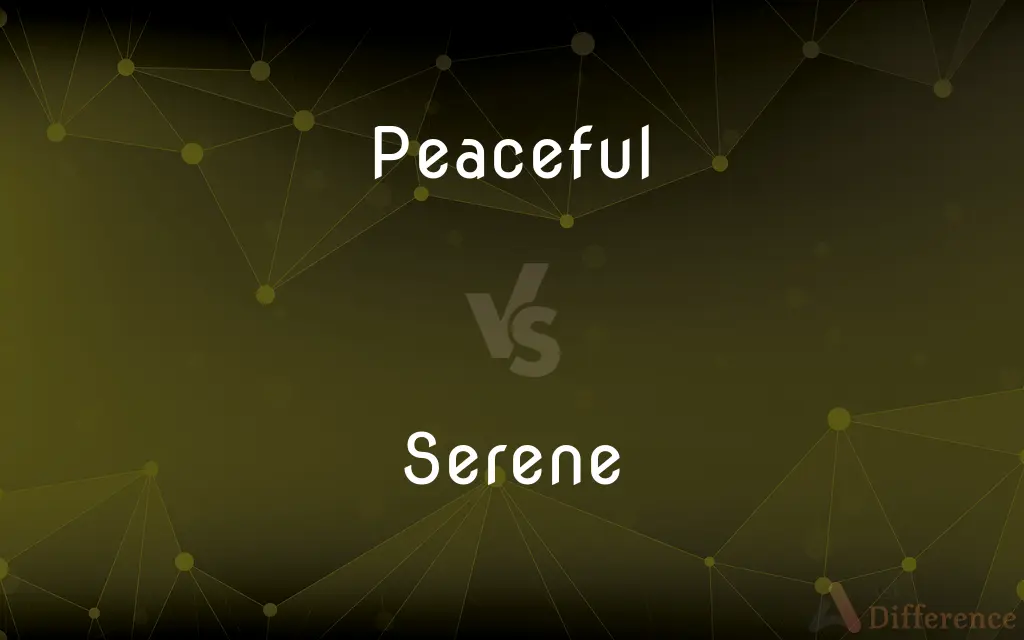Peaceful vs. Serene — What's the Difference?
By Urooj Arif & Fiza Rafique — Updated on May 3, 2024
Peaceful generally refers to an absence of conflict or disturbance, emphasizing tranquility in a broad sense; serene describes a clear, calm, and undisturbed state, often with a deeper emotional resonance.

Difference Between Peaceful and Serene
Table of Contents
ADVERTISEMENT
Key Differences
Peaceful often conveys a sense of general tranquility and freedom from disturbance or conflict, such as in a peaceful neighborhood. On the other hand, serene goes a step further, implying a pristine, clear, and calm quality, like a serene mountain lake.
The term peaceful is commonly used to describe situations or environments where there is no overt conflict or stress, like a peaceful protest or a peaceful day at home. Conversely, serene is more often used to describe scenes or moods that are not just free of chaos but are also positively imbued with calmness and clarity, such as a serene expression or setting.
Peaceful can apply to broader contexts, including social, political, and personal scenarios, where it suggests harmony and non-violence. Serene, however, is typically reserved for describing the quality of an environment or someone's demeanor, highlighting an inner peace and lack of disturbance.
In literature and speech, "peaceful" might be used to reassure or to promote a lack of disturbance, suggesting an external condition. Serene usually conveys an internal state of mind or a naturally tranquil setting, often used poetically to enhance the quality of calm depicted.
While peaceful conditions may result from the resolution of unrest or noise, serenity is often associated with natural or inherent tranquility that suggests a deeper, enduring calmness not dependent on external factors.
ADVERTISEMENT
Comparison Chart
Definition
Free from disturbance or conflict
Clear, calm, and untroubled
Usage
Broader, including social, political, personal contexts
More specific to environment, mood, or demeanor
Emotional Depth
Suggests a basic level of tranquility
Implies a deeper, inherent tranquility
Common Associations
Harmony, absence of conflict
Inner peace, clarity, natural calm
Dependence
Can be a result of external conditions being resolved
Often natural or inherent, less dependent on context
Compare with Definitions
Peaceful
Peacefully resistant in response to injustice.
Passive resistance.
Serene
Calm, peaceful, unruffled.
She looked at her students with joviality and a serene mentality.
Peaceful
(of groups) not violent or disorderly.
The right of peaceful assembly.
Serene
Completely clear and fine.
Serene skies and a bright blue sea.
Peaceful
The peaceful gathering demonstrated the community's desire for harmony.
He enjoyed a peaceful evening at home with no interruptions.
Serene
The serene landscape was perfect for contemplative walks.
Her serene face belied the turmoil she felt inside.
Peaceful
Free from disturbance; tranquil
His peaceful mood vanished
Serene
Content or composed; untroubled
"She remained serene in the face of her accusers" (Peter Matthiessen).
Peaceful
Not involving war or violence
A soldier was shot at an otherwise peaceful demonstration
Serene
Unaffected by disturbance; calm or peaceful
A serene forest.
Peaceful
Undisturbed by strife, turmoil, or disagreement; tranquil
A peaceful hike through the forest.
Serene
Unclouded; fair
Serene skies and a bright blue sea.
Peaceful
Inclined or disposed to peace; peaceable
A peaceful solution to the dispute.
Serene
Often Serene Used as a title and form of address for certain members of royalty
Her Serene Highness.
His Serene Highness.
Peaceful
Not involving violence or employing force
A peaceful protest.
Serene
Without worry or anxiety; unaffected by disturbance.
Peaceful
Not at war; not disturbed by strife or turmoil.
Peaceful protest
Serene
(archaic) Fair and unclouded (as of the sky); clear; unobscured.
Peaceful
Inclined to peace.
Serene
Used as part of certain titles, originally to indicate sovereignty or independence.
Her Serene Highness
Peaceful
Motionless and calm.
Serene
(transitive) To make serene.
Peaceful
A Muslim; especially a violent member of a radical Islamist group.
Serene
(poetic) Serenity; clearness; calmness.
Peaceful
Possessing or enjoying peace; not disturbed by war, tumult, agitation, anxiety, or commotion; quiet; tranquil; as, a peaceful time; a peaceful country; a peaceful end.
Serene
A fine rain from a cloudless sky after sunset.
Peaceful
Not disposed or tending to war, tumult or agitation; pacific; mild; calm; peaceable; as, peaceful words.
Serene
Bright; clear; unabscured; as, a serene sky.
The moon serene in glory mounts the sky.
Full many a gem of purest ray sereneThe dark unfathomed caves of ocean bear.
Peaceful
Not disturbed by strife or turmoil or war;
A peaceful nation
Peaceful times
A far from peaceful Christmas
Peaceful sleep
Serene
Calm; placid; undisturbed; unruffled; as, a serene aspect; a serene soul.
Peaceful
Peacefully resistant in response to injustice;
Passive resistance
Serene
Serenity; clearness; calmness.
To their master is deniedTo share their sweet serene.
Peaceful
(of groups) not violent or disorderly;
The right of peaceful assembly
Serene
Evening air; night chill.
Serene
To make serene.
Heaven and earth, as if contending, vieTo raise his being, and serene his soul.
Serene
Characterized by absence of emotional agitation;
Calm acceptance of the inevitable
Remained serene in the midst of turbulence
A serene expression on her face
She became more tranquil
Tranquil life in the country
Common Curiosities
Is serene a stronger term than peaceful?
Yes, serene is often considered a stronger or more intense expression of calm than peaceful, implying a deeper tranquility.
What is the main emotional difference between peaceful and serene?
Peaceful typically refers to a basic level of tranquility, while serene suggests a deeper, more inherent calmness.
Can a place be peaceful but not serene?
Yes, a place can be peaceful in terms of being free from conflict or noise, yet not serene if it lacks a deep sense of calm or clarity.
Why might someone prefer a serene environment over a merely peaceful one?
A serene environment not only reduces disturbance but also enhances feelings of clear, calm introspection and emotional satisfaction.
What kind of imagery is typically associated with serenity?
Imagery such as calm lakes, quiet gardens, or gently smiling faces are commonly associated with serenity.
Can an environment be serene without being peaceful?
Typically, serenity includes being peaceful, but a serene appearance might mask underlying issues that disturb peace.
How do peaceful and serene relate to stress relief?
Both peaceful and serene environments or states can relieve stress, but serene settings or moments might offer more profound psychological relief due to their deep tranquility.
How do the uses of peaceful and serene differ in literature?
In literature, "peaceful" is often used to set scenes free of conflict, while "serene" is used to evoke a deeper sense of calm and pristine beauty.
What are typical situations where one might describe the atmosphere as peaceful?
Situations without active disturbances, like quiet community settings or calm, conflict-free discussions, are often described as peaceful.
What is a common misconception about peaceful and serene?
A common misconception is that peaceful and serene are interchangeable, when in fact serene implies a higher, more internalized degree of tranquility.
Can music be serene?
Yes, music that is particularly soothing, clear, and undisturbed can be described as serene.
What psychological effects does serenity have?
Serenity can lead to psychological effects such as reduced anxiety, enhanced mindfulness, and improved emotional well-being.
How do peaceful and serene environments benefit mental health?
Both types of environments can foster relaxation and mental clarity, but serene environments may offer deeper therapeutic benefits due to their profound calmness.
How can one create a serene atmosphere at home?
Incorporating elements like soft lighting, calming colors, and tranquil music can help create a serene atmosphere at home.
Does the concept of serenity vary culturally?
Yes, cultural perceptions of serenity can vary, often reflected in art, architecture, and spiritual practices unique to each culture.
Share Your Discovery

Previous Comparison
Support vs. Collaboration
Next Comparison
Prioritised vs. PrioritizedAuthor Spotlight
Written by
Urooj ArifUrooj is a skilled content writer at Ask Difference, known for her exceptional ability to simplify complex topics into engaging and informative content. With a passion for research and a flair for clear, concise writing, she consistently delivers articles that resonate with our diverse audience.
Co-written by
Fiza RafiqueFiza Rafique is a skilled content writer at AskDifference.com, where she meticulously refines and enhances written pieces. Drawing from her vast editorial expertise, Fiza ensures clarity, accuracy, and precision in every article. Passionate about language, she continually seeks to elevate the quality of content for readers worldwide.











































